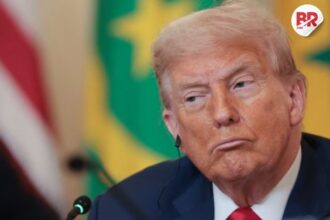
Asian stock markets went up on Thursday, but many markets were closed for Labor Day holidays. This came after U.S. stocks made a strong comeback from early losses, marking their seventh straight day of gains. Investors are still uncertain about what President Donald Trump will do next with the U.S. economy, which continues to worry the markets.
In Japan, the Nikkei 225 index rose by 0.9%, reaching 36,359.24. This happened after the Bank of Japan decided to keep interest rates steady, despite concerns over the effects of Trump’s policies. In Australia, the S&P/ASX 200 index rose slightly by 0.1%, reaching 8,137.40.

On Wednesday, the S&P 500 increased by 0.1%, marking its seventh day of gains, closing at 5,569.06. The Dow Jones also rose by 0.3% to 40,669.36, while the Nasdaq dropped slightly by 0.1% to 17,446.34. This was a huge turnaround, considering earlier in the day, the S&P 500 had fallen by 2.3% and the Dow had dropped 780 points.
Read More: Why Did Oil Prices Drop? The Unexpected Cause You Need to Know!
The market initially struggled after a report showed that the U.S. economy performed worse than expected at the start of the year. The economy was hurt by companies rushing to import goods before tariffs made them more expensive, which affected overall economic growth. This sparked concerns about a situation called “stagflation,” where the economy slows down but inflation stays high. Economists worry about this because the Federal Reserve (the U.S. central bank) doesn’t have easy solutions to fix both problems at once. Trying to solve one could make the other worse.
Later in the day, there was some good news. A report showed that inflation slowed to 2.3% in March, which is closer to the Fed’s target of 2%. This gave hope that the Fed could cut interest rates to help the economy. But there are still worries about a slowing economy.
A report on the job market also showed that businesses outside the government hired fewer workers than expected in April, which could be a sign of trouble. The job market has been a key reason the U.S. economy has remained stable. A more detailed report on the job market is expected on Friday.
Also See: Wall Street Drops Suddenly — Is a Recession Coming Soon?
Overall, many reports raised concerns about the impact of Trump’s trade war, which may push the U.S. economy into a recession. The president’s unpredictable decisions about tariffs have caused uncertainty in the markets, creating big ups and downs, especially through April. At one point, there were even warnings that April could be one of the worst months for the stock market since the Great Depression. In the end, the S&P 500’s loss for April was just 0.8%, much smaller than the drop in March, but still 9.4% below its record high.
In the bond market, investors expect the Fed to lower interest rates, which caused the yield on the 10-year Treasury bond to drop slightly to 4.17% from 4.19%.
Meanwhile, oil prices dropped slightly. U.S. benchmark crude fell 10 cents to $58.11 a barrel, and Brent crude, the international oil price, decreased by 5 cents to $61.01 a barrel. The U.S. dollar rose against the Japanese yen, reaching 143.88 yen, up from 143.06 yen. The euro dropped slightly to $1.1308 from $1.1331.












